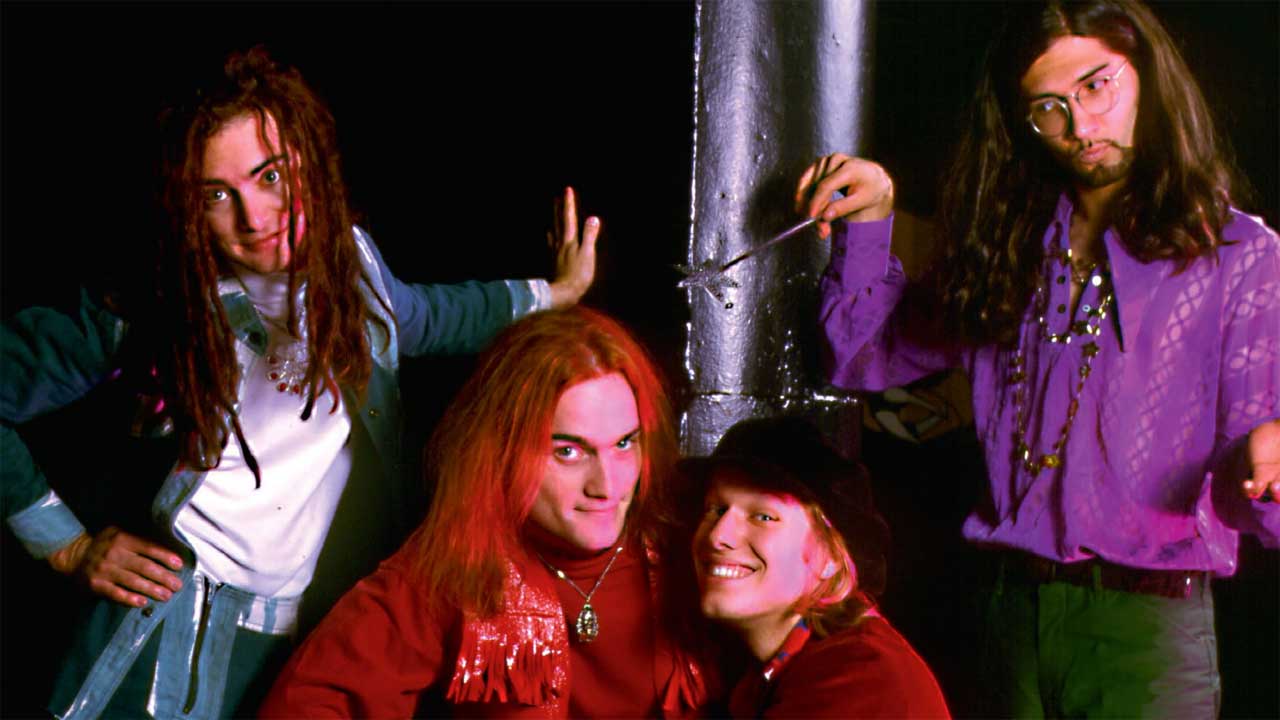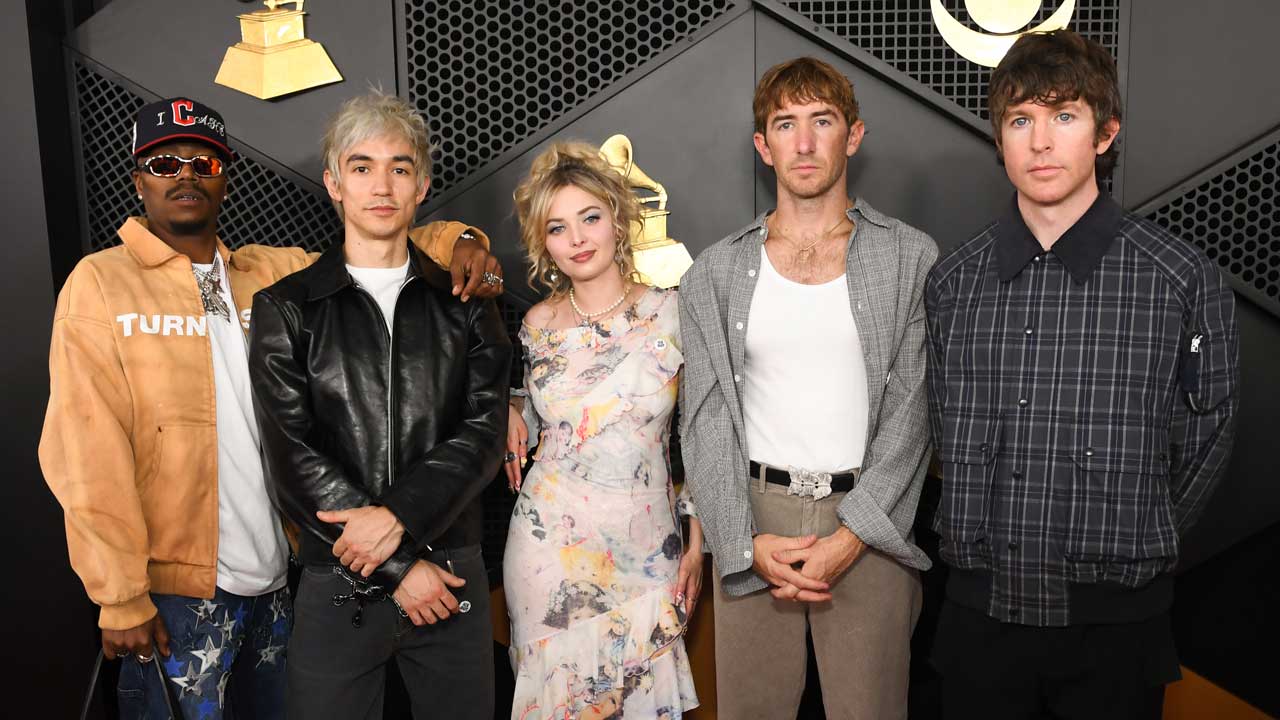How the paisley underground and a fairy tale inspired Jellyfish's classic single The King Is Half-Undressed
"We didn’t really care about scenes: For us, it always came down to the song” - Jellyfish's Roger Manning Jr

Jellyfish were the right band at the wrong time. Their first single, The King Is Half-Undressed, in 1991, sounded like The Beatles, Queen and ELO rolled into one – a baroquerock blitz that should have made them huge right out of the gate. But in 1990 they arrived on a scene that was ruled by two trends: boy bands and grunge.
“Not only did we not fit with the sounds of the time,” Roger Manning Jr. tells Classic Rock, “but it was very clear that what Andy [Sturmer] and I enjoyed writing and collaborating on, our sound and vision, was going further and further away from our generation at that time. But we didn’t really care about scenes. For us, it always came down to the song.”
Manning and Sturmer met in high school in San Francisco, bonding over record collections and a love of 60s melodic pop. Their first band together, Beatnik Beatch, got signed to Atlantic, then “quickly got lost in the shuffle”. From the wreckage, the two friends formed the nucleus of Jellyfish.
Of their early days, Manning recalls: “I was working sales at a music store in Haight-Ashbury. I dreaded it, but at least I could make enough to pay for the closet I was living in for a few hundred a month. It was a starving-artist, eye-on-the-prize, but pretty humiliating existence. But it happened to be an existence set in the basement of a recording studio.”
Following the lead of studio-hermit artists such as Talking Heads and Tears For Fears, the pair started logging every spare moment demo-ing their songs and learning about recording.
“We got used to being these lone guns,” Manning says. “A lot of our heroes talked about getting record deals through the demo process, not through playing the club circuit and getting discovered by some record company scout. It was more like, figure out how to make the best-sounding demo you can with the equipment you have, and that’s what’ll seal the deal.
“That’s what we believed in,” Manning continues. “We didn’t really have a choice, because we didn’t have a band yet. So we taught ourselves all the technology.”
Sign up below to get the latest from Classic Rock, plus exclusive special offers, direct to your inbox!
Along with their technical forays, the friends were constantly composing. The King Is Half-Undressed began with a verse idea that Manning says was sparked by his brief stint playing keyboards with the Paisley Underground band The Corsairs.
“They were led by Alan Shalby, who was just this wunderkind. A surfer, a car mechanic and an incredible songwriter. He was like a Beach Boy out of the sixties, but in the late eighties. He was also the big brother I never had to kick my ass creatively. He encouraged me. It was more education than I’d received in any course in music school.
“So I started The King Is Half Undressed literally just copping this verse feel that Alan had in one of his songs. Of course, I changed the chords and melody. I was very excited about it, and brought it to Andy. In fifteen minutes we finished the chorus together. He came up with that repetitive melodic pattern, and we just sat there, streamlining it. We were both like: ‘Wow, that’s solid!’”
The evocative title, a play on Hans Christian Andersen’s folktale The Emperor’s New Clothes, inspired a free-associative lyric from Sturmer. In 1993 he told me: “As a lyricist, I try not to edit myself, because I think when you do that kind of Kerouac-type of writing, just blurting things out, that’s the real window to your psyche.
"It’s like speaking in tongues, and you’ll hit on certain phrases that really resonate. And it’s funny, a lot of people will come up to me quoting some lyric back to me, a line that I wouldn’t have thought would make sense to anybody, and it touches them in some way. The King Is Half-Undressed has an element of that.”
Their demo served as a blueprint for the recording, with two changes. “Our producer Albhy Galuten suggested we try a different feel on the verse,” says Manning, “which led Andy to come up with that Tomorrow Never Knows-type groove. It was intense to watch him perform that live. It was quite athletic. And then Jason [Falkner, guitar] came up with the idea for the vocal interlude section, with those Crosby, Stills And Nash cluster-type harmony vocals. That really sealed it for me. Then we wanted a further departure, where the song came down to almost nothing before we return to the chorus out. ”
The end result was insanely catchy, but, at four minutes and with tempo shifts, a challenging spin for radio.
“Every song on [Jellyfish’s 1990 debut album] Bellybutton was completely irrelevant to what was currently going on in commercial music,” Manning says with a laugh. “But all the songs are single-worthy. We were adamant about having a chorus that was some kind of ear worm. The label got behind it. So did MTV. So initially the song came out guns blazing.”
The single made the UK Top 40 and got college radio play in the States. Now included in When These Memories Fade, a singles box set, The King Is Half-Undressed is part of the story of a late-lamented band whose two-year, two-album legacy grows stronger every year. The reclusive Sturmer now writes music for cartoons and Japanese pop bands. Manning is more visible as a member of Beck’s band and The Lickerish Quartet (with ex-Jellyfish members Tim Smith and Eric Dover).
Looking back on Jellyfish’s brief but indelible moment, Manning says: “There was never any intention of disbanding as early as we did. Circumstances force you to make choices; there are always forks in the road. We couldn’t hold it together personally. I’m amazed that we got the attention of as many people as we did.”
When These Memories Fade is out now via New Land.
Bill DeMain is a correspondent for BBC Glasgow, a regular contributor to MOJO, Classic Rock and Mental Floss, and the author of six books, including the best-selling Sgt. Pepper At 50. He is also an acclaimed musician and songwriter who's written for artists including Marshall Crenshaw, Teddy Thompson and Kim Richey. His songs have appeared in TV shows such as Private Practice and Sons of Anarchy. In 2013, he started Walkin' Nashville, a music history tour that's been the #1 rated activity on Trip Advisor. An avid bird-watcher, he also makes bird cards and prints.

